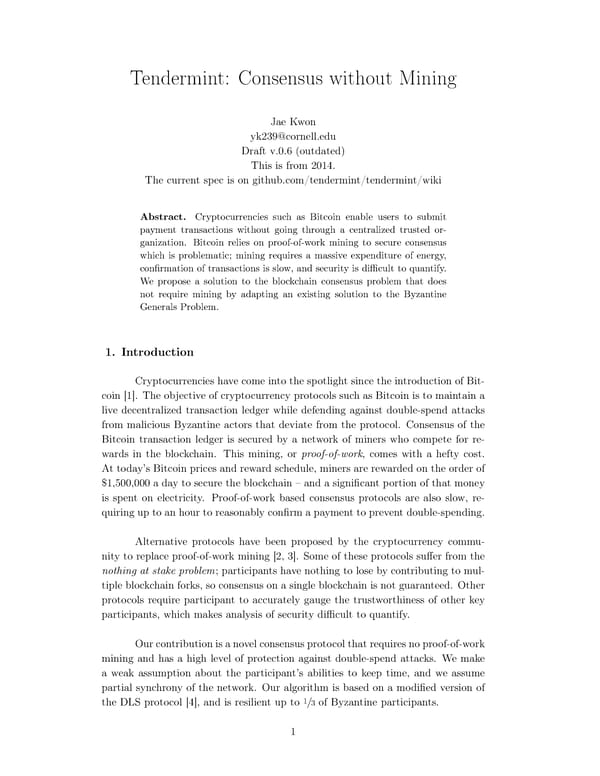Tendermint: Consensus without Mining
Tendermint: Consensus without Mining Jae Kwon yk239@cornell.edu Draft v.0.6 (outdated) This is from 2014. The current spec is on github.com/tendermint/tendermint/wiki Abstract. Cryptocurrencies such as Bitcoin enable users to submit payment transactions without going through a centralized trusted or- ganization. Bitcoin relies on proof-of-work mining to secure consensus which is problematic; mining requires a massive expenditure of energy, confirmation of transactions is slow, and security is difficult to quantify. We propose a solution to the blockchain consensus problem that does not require mining by adapting an existing solution to the Byzantine Generals Problem. 1. Introduction Cryptocurrencies have come into the spotlight since the introduction of Bit- coin [1]. The objective of cryptocurrency protocols such as Bitcoin is to maintain a live decentralized transaction ledger while defending against double-spend attacks from malicious Byzantine actors that deviate from the protocol. Consensus of the Bitcoin transaction ledger is secured by a network of miners who compete for re- wards in the blockchain. This mining, or proof-of-work, comes with a hefty cost. At today’s Bitcoin prices and reward schedule, miners are rewarded on the order of $1,500,000 a day to secure the blockchain – and a significant portion of that money is spent on electricity. Proof-of-work based consensus protocols are also slow, re- quiring up to an hour to reasonably confirm a payment to prevent double-spending. Alternative protocols have been proposed by the cryptocurrency commu- nity to replace proof-of-work mining [2, 3]. Some of these protocols suffer from the nothing at stake problem; participants have nothing to lose by contributing to mul- tiple blockchain forks, so consensus on a single blockchain is not guaranteed. Other protocols require participant to accurately gauge the trustworthiness of other key participants, which makes analysis of security difficult to quantify. Ourcontributionisanovelconsensusprotocolthatrequiresnoproof-of-work mining and has a high level of protection against double-spend attacks. We make a weak assumption about the participant’s abilities to keep time, and we assume partial synchrony of the network. Our algorithm is based on a modified version of 1 the DLS protocol [4], and is resilient up to /3 of Byzantine participants. 1
 Tendermint: Consensus without Mining Page 2
Tendermint: Consensus without Mining Page 2